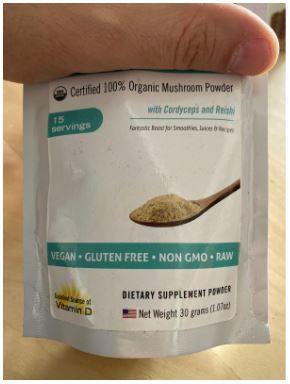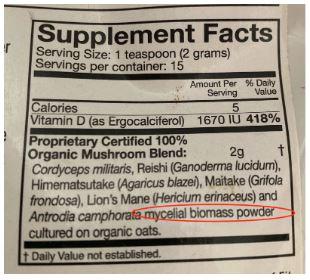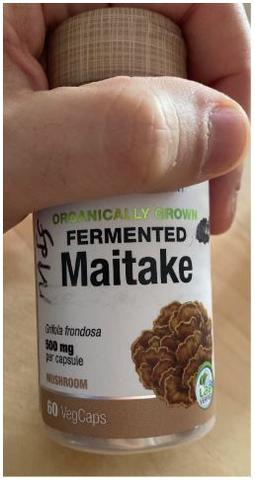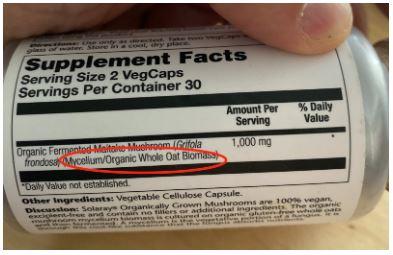One of the best parts of my job is all the great conversations that take place after we share our content.
After my last mushroom blog & podcast, I’ve heard from dozens and dozens of people about their mushroom supplements.
The common thread in all those chats? People now realize they aren’t taking real mushrooms.
“Yeah, you said that like 4 times now, why do you have to say it again now?” Jeez… awfully testy today, voice in my head!
The big deal is that people BELIEVE their products are real mushrooms. The bigger deal is that each person was deceived because the brands and their respective gurus have doubled-down on misinformation.
They’re pulling out all the stops and going to great lengths to steal not only your money, but your trust.
Today, I rant about the fungal nature of mushroom misinformation. And trust me, this is a RANT.
The thing about fungal infections is that they CAN be cured, it just takes consistent treatment for a long period.
A Mushroom Review
I just want to briefly review mushroom supplements. When I tell you my supplement is a mushroom supplement, either by naming my product “Neal’s Mushrooms” or putting pictures of mushrooms on the bottle of mushrooms, what are you hoping is in the pill?
It’s cool. Think about it. I’ll wait…
OOOH… This stuff:
Actual. Freakin’. Mushrooms!

That’s all well and good, but I’ve got a proposal for ya’! What if… stay with me now… I didn’t give you any of that. Instead, I’ll give you mostly rice and some mushroom roots. Would you be cool with that?
I hope not.
As I pointed out in my Most Mushrooms Are Not Magical blog, many mushroom products on the market do not contain any actual mushrooms.
Instead, these products use just the first stages of growth, the mycelium (or roots, if you will) that are grown on a rice or grain substrate. No mushrooms are grown, harvested, or had their magical goodness extracted.
We have roots and rice, which will have negligible, if any of the active compounds found in mushrooms, and a whooooole lot of starch.
Remember a simple point: the beneficial compounds of mushrooms are found almost exclusively in the mushroom. Ideally, we get a mushroom extract from the actual mushroom.
The Nuance, Then The Bait-and-Switch
There’s a little bit of refinement to this idea that we only want the whole mushroom.
Sometimes it’s insanely expensive to harvest the real mushroom. In the case of cordyceps, this mushroom grows on bugs. It’s difficult to harvest, and they’ve tried a long time to get it done to scale. No go, however, and as a result, it’s a billion bucks a kilogram. No one wants to spend that much, and we Millenials are broke and working 3 jobs to pay off college debt.
Thankfully, they’ve researched and developed strains of cordyceps that don’t need bugs. The mycelium of these specific strains actually do contain some beneficial compounds. The same is true of some extracts of Turkey Tail.
This mycelium is different than myceliated grain because they grow it in a way where you can separate the mycelium from the growth medium. Myceliated grain is stuck, liquid fermentation is not. With myceliated grain, you can’t, and you’re getting upwards of 60% rice, 40% roots, and 0% mushrooms.
Here’s the thing – you probably didn’t know that until now. Heck, many readers probably didn’t know that there was such a thing as mycelium. One more to the pile: most people don’t know or believe that you can call your product mushroom and it not contain mushrooms.
The uber bait-and-switch comes when a brand can say, “Mycelium DOES contain beneficial compounds and our product uses mycelium.” Technically, yes, it’s got mycelium, but it’s myceliated grain.
When supplement brands sell you myceliated grain, they are doing the ultimate bait-and-switch.
That statement is larger because it’s the one truth any mushroom consumer should know. They’re connecting dots that do not belong connected.
Here’s a few examples of mushroom bait-and-switch that have been sitting by my desk waiting for this rant to happen:

Wow – certified organic mushroom powder? Also Non-GMO? I NEED THIS! Wait a sec… what does that say on the one source of truth, the Supplement Facts Panel?

Well, what about this one! This is a trustworthy brand! Big picture of a beautiful maitake mushroom!

Oh come on… this one too?

This kind of thing happens in every vertical of the supplement industry. And to be honest, I’ve said this before, even in the mushroom space. So what’s different today?
In mushrooms, we have someone trying to rewrite history AND science…
The Transparent Liars
There is one brand of mushrooms that is completely honest that they are using myceliated grain as their raw material for most of their products.
They proudly declare that their products are myceliated biomass. To combat the people from saying “WTF” or “Heck no”, the brand has created a large moat of trust (and in my opinion, it’s unearned) and misinformation to protect their castle of lies.
The founder is well known, and despite spreading complete falsehoods about mushroom science, he is trusted. He and his brand are the motivation for this rant. And I can’t even say his name and I rewrote this content a few times, because, as my 10-year-old daughter says, “reasons…” More on this later.
Anyway, after sending out my mushroom myth debunking pieces, I received a few emails linking to the brand’s website or the guru’s lectures. I’ve been advised to not even include them here to prevent any legal action.
Imagine a well written educational piece about mushrooms, except they’re claiming the established science is incorrect. It seems informed and unbiased.
What this brand is doing, at the direction of their mushroom guru, is speaking the truth to enough of a degree to gain the trust of a casual reader. They then twist things a bit, and throw shade at established science.
They list the “Seven Pillars of Immune Benefits from Mushrooms,” which are the mushroom components any mushroom expert will tell you are important. The bait-and-switch is two-fold.
First, they are stating these things are important, but provide no proof that their myceliated biomass has those compounds. In fact, myceliated biomass does NOT have those compounds, as the real experts have shown for some time.
Secondly, they go to great lengths to further justify their myceliated biomass deceptively. Here’s pillar number one:
I – Polysaccharides (ex. Alpha & Beta-glucans): Immunomodulating
Alpha-glucans do not have a tremendous immunomodulating effect. They’re a side component of any plant. They should be very low concentrations in mushroom extracts but alpha-glucans will be high in starchy compounds like rice.
Beta-glucans are the components we’re looking for. They lump alpha and beta-glucans together like the banks did with subprime mortgages. To someone not paying attention, everything looks on the up and up.
They then proceed to bash the accuracy of beta-glucan testing, citing all sorts of research and trials-and-tribulations. None of which are true, and their claims have been debunked.
I can go on and on through their products, blogs, and lectures online. Who wants to read all that?
What matters is the fame and reach of the guru is what allows these lies to create a new mindset. It spreads and takes hold sort of like fungus.
The consistent nature reinforces a mindset that is factually inaccurate but financially benefits the company. Is this just a savvy form of fraud?
The Science Isn’t Wrong
In my flu shot article, one of the points I make is that misinformation campaigns like the ones against vaccines or climate change become successful because they throw into question the consensus.
With mushrooms, the active components, where they come from, how they are tested, and what doesn’t work is well established.
I believe that the loudest voice in the mushroom scene is rearranging the science and twisting the truth in order to fit his business model.
It’s not economically feasible to grow mushrooms for supplement extracts in North America, and the margin is MUCH higher using myceliated biomass.
It’s radically easier to bend the truth and do the bait-and-switch than it is to change your entire infrastructure.
What’s more likely? The validated research of those proven to be experts is wrong or completely missed something, or this guy is using misinformation to justify his poor products? It’s clear to see, without a doubt, when presented this way.
The Struggle Is Real
In all of us though, there’s an internal struggle. Let me step inside your shoes as a consumer.
Neal says, “This is the truth based on the science and these experts who have advanced the field.” Any random person can say, “But THIS mushroom guy says THIS is true.”
Soon enough, this is what an average consumer will see:

We have the truth, then we have the skewed truth. Because the person skewing the truth has gained trust, it seems like this is just a disagreement in the reading of the literature.
The guy with the shiny object we’re paying attention to has a persona. That persona checks off all the boxes for trustworthy. So much so, that we actually question the watchmen.
And this is where we seize up. The brain stops, we check out. If we were following along in the conversation, we now know we can’t possibly know all the facts and discern the truth, and we go with whatever story is easiest for us to accept.
…. Ohhh.. I just did it again…
“Hang on a second, this isn’t really about mushrooms, is it Neal?” Looks like you’re getting better at this Monthly Rant stuff, gang…
I’ve just pulled a bait-and-switch on you. This rant isn’t about mushrooms, real or fake. This is about you and trust.
One Simple Question
If we had to answer one question to help us understand our modern supplement dilemma, it would be:
“Why is this guy trusted, to begin with?”
- Is it because what they’re saying makes sense on the surface? Because it seems factually accurate?
- Is it because they’ve done a TED talk?
- Is it because they’re everywhere? They’re on lots of shows, and they’re consistently saying the same thing, bringing their message to a large audience.
I mean, minus the TED talk, I’ve just described Milo Yiannopoulos. Is he trustworthy? To some, yes. Is he telling the truth? Is he acting with integrity?
Maybe, but the reality is different:
- These personas are everywhere because they have aggressive PR teams and marketing departments
- These personas seem to be speaking the truth because they’ve got an aggressive legal team that sends cease and desist letters to those who criticize them openly.
If you have a big reach, you can drop lots of misinformation everywhere. If you do it consistently enough, you can become authoritative in the eyes of consumers.
This goes for everyone, even me. Too often do I hear people say, “I trust you implicitly.” I don’t know what implicitly means, but I assume it’s good for me.
It’s too easy to take this trust and my original intentions, and completely sell out. Do you know how hard it is for me to stomp around telling people what not to do, when I could as easily sell them 20 herbal supplements for Lyme disease? I’ve got a great life, but I would sure like a Tesla!
Also, if you have enough power, you can silence dissenters. This is why I won’t use pictures or call this person out directly.
This is a sign of the times; the wellness-industrial complex is at peak.
This era we’re residing in will have a distinction unlike others before it…
The Golden Age of The Con
All of this mushroom stuff is just fodder for the cannon. The blast to the face is that we’re living in the Golden Age of the Con, as someone astutely called it, and we are falling for it over and over and over.
What’s the reason for it? As I’ve touched on before, the biggest reason we’ve become such easy marks is the information overload we’re experiencing.
There’s too much to process. Too much to validate.
Look at large newspapers like the New York Times – they have summaries of their short articles at the top and sometimes middle and bottom as well. They know most people aren’t reading, but skimming.
There’s too much info, so we start using shortcuts. These shortcuts are easy to exploit, as I’ve mentioned numerous times before. “Well, he’s a doctor.” “They have a large following.” One logical fallacy or another, we dig deep into a world view, but that world view is being manipulated by the algorithm.
I’ve proposed methods for evaluating who is deserving of your trust, but today I’d like to put forward a different approach to these problems.
A New Solution To The Charlatan
Old methods won’t work. We need a fix to combat this age.
I suggest a return to community. Not online. IRL, as the kids say.
If we wanted to, at any time, we could literally squak or tweeter directly to the President or more importantly Kanye. Our world is “small” in that we’re directly connected to everyone, but our world and attention is focused on a much larger scale than it ever has.
I want you to make your world smaller. Bring it back to the old days. Build personal relationships. Focus on the experts that are closer to you.
Give the people you ask advice a reason to guide you correctly. The internet, media, and the national gurus can’t substitute for community.
The number one business objective in our modern world is not monetary. Well, not directly. We are fighting for attention. Attention is not enough as it doesn’t last. There has to be a reason for people to stick around.
The real goal is to garner trust. If you win a consumer’s trust, you’ve won the game. Trust is an emotional connection and emotions are tough to break. Trust can persist through corruption and lies, even in the face of truth, science, and facts.
I feel it’s easy to lend trust locally in your smaller world. Why? If they betray your trust, you can punch them in the face. Not literally, but they are within reach.
It takes a lot to lie directly to people’s faces, especially if you are all part of the same community. It’s quicker and easier to evaluate facts. We’ve evolved in these smaller communities, and we’re really good at navigating the dynamics of them.
If we decide that we do want to engage with the larger, national scale – an ability that is really less than a decade old – then we absolutely have to do more work than we all currently do.
If you choose the national expert, you better understand all the axes they’re grinding and all the tricks they’re using to make you think of them in the same light you would someone in your community.
Don’t let those psychological weak spots or ‘shortcuts’ guide your decisions when dealing with the talking heads outside of your smaller world.
The Lengths This Fungus Will Grow
If you don’t know by now, we’re advocates for Real Mushrooms. Skye Chilton is the founder. His dad, Jeff, owns Nammex, a leading mushroom extract company.
Jeff is responsible for bringing organic farming to China. They’ve both proven themselves to me to be exactly what we want in a mushroom guru: committed to doing what is right for the end user, not explicitly their bottom lines.
Back to the ranty-poo…
We are so desperate to find a truth, but we’re too overwhelmed to validate it. As a result, we use shortcuts.
We accept the versions of the truth sold to us by the most persuasive. In this national tier are good people, but it is filled with those who have figured out the shortcut system and are gaming it for financial gain.
In the natural products world, it’s everywhere. In essential oils, as discussed in blog and podcast, just because the louder, better funded and farther-reaching voices are speaking, doesn’t mean they’re speaking the complete truth.
Just like a vitamin marketed as whole food that doesn’t have any food in the pill, but instead yeast or a speck of fruit powder, isn’t a whole food, myceliated grain is not a proper mushroom supplement.
Mushroom manufacturers and gurus are exploiting our shortcuts to pull off a major bait-and-switch.
Either with their marketing misdirection, where their labels and content are bending reality our outright lying, or trying to rewrite the scientific history to fit their narrative, the gap between the products you want and what you are actually getting grows wider.
The thing about this fungal infection is that it CAN be cured.
The treatment of this fungus among us involves making your world smaller. It involves looking at gurus in a different light, and really putting them to the screws before you are to accept their truth.
We need to get mad when these charlatans do this stuff. We should vet these brands and “experts” way more aggressively before we buy in.
We can treat it. We can prevent it.
It involves consistency. Every day, take back the power from the gurus. Forget the shortcuts. Set small goals for your health and wellness. Reflect on your daily decisions and how they are impacting your progress.
You have everything you need to live your best life. Of course, I’m partial to the Wellness Pyramid. Climb it, ignore the hype. Then, we can talk about which mushroom is best for you.
Just trying to keep it real…

Neal Smoller, PharmD
Owner, Pharmacist, Big Mouth



